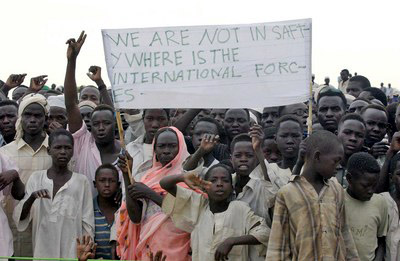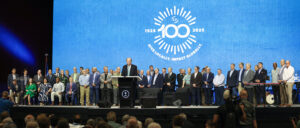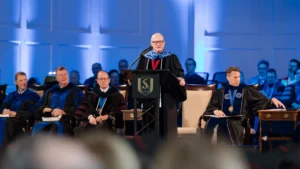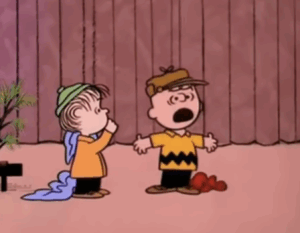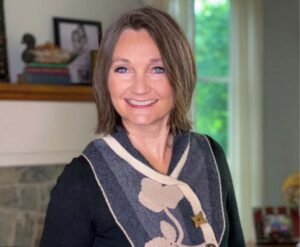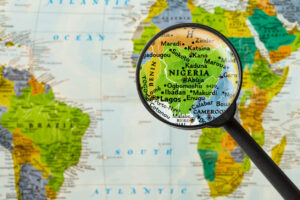
WASHINGTON (BP)–Southern Baptist ethicist Richard Land, joining a diverse group of evangelicals in a teleconference on the bloodshed in Darfur, noted that “would-be perpetrators of genocide in other capitals around the world are watching closely to see if we are going to allow the gangsters in Khartoum [Sudan’s capital] to get away with it.”
The Evangelicals for Darfur coalition (EvangelicalsforDarfur.org) ran full-page advertisements Oct. 18 in The New York Times, The Washington Post and USA Today, among other papers, calling on President Bush to jumpstart the process of dispatching United Nations peacekeepers to the war-torn Darfur region of Sudan.
Land, president of the SBC’s Ethic & Religious Liberty Commission, said the “extraordinary coalition” -– including Jim Wallis, president of Sojourners; Richard Cizik of the National Association of Evangelicals; and Samuel Rodriguez, president of the National Hispanic Christian Leadership Conference — was prompted in part by what they see as a lot of hand-wringing and well-meaning talk within the world community on the tragedy that continues to unfold in Darfur — but no action.
According to recent estimates, at least 400,000 people have died in Darfur since the genocide in the North African country began in early 2003. Darfur, located in western Sudan, has been targeted by the Sudanese military and government-financed militia. Approximately 3.5 million people, mostly Muslim, are the prey in the violence and forced starvation.
Wallis, acknowledging evangelicals rarely speak with a “monolithic voice,” said, “When an issue is not about Republicans or Democrats, conservatives or liberals, even Christians or Muslims, when it’s about compassion and the commands of God, which this is about, you are going to see us come together across our sometimes differences and other questions.”
Wallis said he hopes the union of evangelical leaders on this issue could become a “tipping point to finally turn our moral energy toward the people of Darfur.”
In August 2006, a United Nations resolution authorized a peacekeeping force for Darfur to replace an underfunded and resource-short African Union force assigned to protect Darfurian refugees. Yet the Sudanese government continues to block the deployment of the U.N. peacekeepers to the region. So the killing and mayhem continue, Land and others said.
International disagreements appear to have stymied the world in “doing anything to stop the horrors of Darfur,” Wallis said. “Politics is preventing Darfur from becoming the priority that conscience demands it be.”
The coalition is seeking “to put this issue on the front pages of our consciences and the front pages of our newspapers,” Wallis said. “Until we resolve this, we can’t stop talking about it.
“People of faith must act and we must act quickly to save lives,” Wallis said. “Scores of men, women and children who are created in God’s image are being torn from their families and led to certain death with each passing day.” Relief aid for the displaced civilians is spotty and risky. Press reports indicate that more humanitarian aid workers were killed in July than in the three previous years combined.
Land called the situation in Darfur a “profound moral test for the world.”
“We cannot allow the 21st century to begin with the kind of genocide that the 20th century ended with in Rwanda,” Land emphasized. Unless President Bush acts to rally world leadership to put pressure on the Sudanese government to stop the genocide, the genocide will not stop, Land warned.
One of the profound moral questions the world faces in the 21st century, Land said, is the fact that the “most grievous, grotesque violations of human rights are often being committed by governments against groups within their own borders.”
The world community needs to find a way to overcome the “impediment of national boundaries” where the perpetrators of genocide exercise a type of veto power over what can be done to rescue those who are the victims of the genocide, Land said.
Wallis agreed, saying, “Old notions of national sovereignty can’t be allowed to justify genocide.” He bemoaned the fact that the veto power being exercised by certain governments is “preventing conscience from being operational.”
Cizik suggested that the world’s reluctance to act on its promise of aid reveals an “unwillingness to push lest we upset a Muslim capital that is led by extremists who will then call in other extremists to fight the ‘crusader West.’”
“To be immobilized at this point on Darfur is conceding something we should not concede — our capacity to lead and to act,” Cizik said.
Cizik and the others said they are not in favor of introducing American troops into the conflict, but he said, “America must show that it’s still a leader.”
Wallis called on Bush to “act on his faith” and to exercise “strong leadership” in doing “whatever is necessary to place a multinational peacekeeping force in Darfur.”
“The president can’t do it alone; America can’t do it alone,” Land said. “Yet unless America takes the leadership role in the world, nothing gets done.”
Without a multinational force with the “military teeth necessary to protect these people,” Land said, genocidal ethnic cleansing will continue in the region. “We have a moral imperative to act,” he said.
“Who is my neighbor?” asked Rodriguez, referring to Christ’s parable of the Good Samaritan. “My neighbor is the woman being raped; the child mutilated and burned; the villages burned. My neighbor is Darfur and we must act now,” he said.
To those who wonder if evangelicals can focus only on a handful of issues, such as those dealing with the sanctity of human life, Land said: “If we are commanded by Jesus to be ‘salt’ and ‘light,’ then ‘salt’ and ‘light’ is to be applied to all of society. We are to seek to make a difference wherever we see injustice and where we see wrong in every area of society.
“That command to be ‘salt’ and ‘light’ doesn’t stop at the borders of the United States,” Land insisted. “It is time to go from resolution to action.”
–30–
